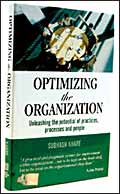 |
COMPLEX ISSUES MANAGEMENT:
STRATEGIES AND TACTICS
By Ranjan Das with Kajari
Mukherjee
Tata McGraw-Hill
Pp: 397
Price: Rs 450 |
Any
manager who has ever tried selling anything globally will readily
agree that the world markets today are much more complex than
what they were earlier. We also know the reasons behind it: Thanks
to globalisation, countries and markets are deeply integrated;
thanks to the internet and satellite television, consumer behaviours
and aspirations are changing in unpredictable ways; domestic political
issues tend to snowball into global issues; and regulations are
getting far more complicated. The field of management education
has a name for this emerging phenomenon: It's called a complex
system. And Ranjan Das, Professor of Strategic and International
Management at IIM Calcutta, argues that complexity is here to
stay. So what managers need to do is to learn how to approach
complex issues in order to make sound decisions.
But first, what are the characteristics of
a complex system? Typically, a complex system has many moving
parts, each with a mind of its own. What makes the system so unpredictable
is the fact that these "interactions can move the system
towards stabilisation and orderliness, as well as push (it) towards
disequilibrium, where there is a danger of the system degenerating
into chaos", say the authors. That is, complex systems are
one where order and chaos are forever in uneasy balance, and it
is far easy for the system to tip over into chaos than to maintain
its balance. To be able to manage a complex system, Das and Mukherjee
argue, the manager must have a mindset that "encourages new
ideas, is comfortable with improvisations, can take leaps of faith
even with incomplete information...".
The authors illustrate the theory with a
case study on Delhi's switchover from diesel to CNG for buses.
The problems of doing so are seen through the eyes of Indraprastha
Gas Ltd, a company set up by GAIL, BPCL and the Delhi government
to supply clean fuel CNG in the city. Arguably, there are far
more complex issues that the authors could have taken up, but
"given the uniqueness of the research topic and also that
complexity theory is still a growing field, the authors felt it
necessary to use a single case, since the objective is to do 'theory
building'". The authors' effort is laudable. Usually, Indian
writers on management resort to well-known international case
studies to buttress their theories. However, Das and Mukherjee
have not just chosen to take on a budding field of complexity
theory, but research a uniquely Indian case in the context. No
doubt, more such work will add tremendously to sparse management
literature on local issues.
 |
OPTIMIZING THE ORGANIZATION
By Subhash Khare
Tata McGraw-Hill
Pp: 194
Price: Rs 395 |
Perhaps
one should stop complaining about a lack of published management
research in India. Khare's Optimizing the Organization is based
on Wipro's own struggle at striking a balance between immediate
goals and future targets. Therefore, as Chairman Azim Premji points
out in his foreword to the book, "the 'mezzanine' or 1,000
feet view that his book takes will be even more helpful than a
look at this battle from the cockpit of a plane at 30,000 feet".
The book is structured very simply, with Khare, Head of Staffing
and Central Productivity at the IT giant, beginning with an explanation
of optimisation, followed by more detailed how-to's on improving
efficiency and productivity. As is evident, Khare takes a "process-view"
of the organisation. Therefore, companies that are caught in a
struggle to optimise their resources will find Khare's book useful.
The author doesn't pretend to offer yet another methodology for
optimisation, but only outlines some key approaches based on his
own experiences at Wipro.
That also means the book is relevant for
all types of organisations, and not just IT companies.
|






